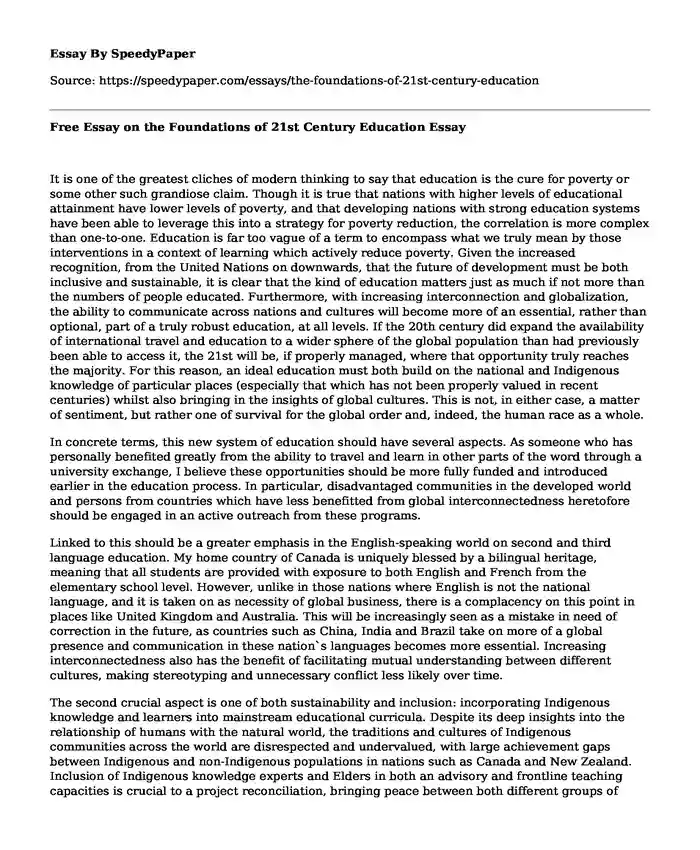It is one of the greatest cliches of modern thinking to say that education is the cure for poverty or some other such grandiose claim. Though it is true that nations with higher levels of educational attainment have lower levels of poverty, and that developing nations with strong education systems have been able to leverage this into a strategy for poverty reduction, the correlation is more complex than one-to-one. Education is far too vague of a term to encompass what we truly mean by those interventions in a context of learning which actively reduce poverty. Given the increased recognition, from the United Nations on downwards, that the future of development must be both inclusive and sustainable, it is clear that the kind of education matters just as much if not more than the numbers of people educated. Furthermore, with increasing interconnection and globalization, the ability to communicate across nations and cultures will become more of an essential, rather than optional, part of a truly robust education, at all levels. If the 20th century did expand the availability of international travel and education to a wider sphere of the global population than had previously been able to access it, the 21st will be, if properly managed, where that opportunity truly reaches the majority. For this reason, an ideal education must both build on the national and Indigenous knowledge of particular places (especially that which has not been properly valued in recent centuries) whilst also bringing in the insights of global cultures. This is not, in either case, a matter of sentiment, but rather one of survival for the global order and, indeed, the human race as a whole.
In concrete terms, this new system of education should have several aspects. As someone who has personally benefited greatly from the ability to travel and learn in other parts of the word through a university exchange, I believe these opportunities should be more fully funded and introduced earlier in the education process. In particular, disadvantaged communities in the developed world and persons from countries which have less benefitted from global interconnectedness heretofore should be engaged in an active outreach from these programs.
Linked to this should be a greater emphasis in the English-speaking world on second and third language education. My home country of Canada is uniquely blessed by a bilingual heritage, meaning that all students are provided with exposure to both English and French from the elementary school level. However, unlike in those nations where English is not the national language, and it is taken on as necessity of global business, there is a complacency on this point in places like United Kingdom and Australia. This will be increasingly seen as a mistake in need of correction in the future, as countries such as China, India and Brazil take on more of a global presence and communication in these nation`s languages becomes more essential. Increasing interconnectedness also has the benefit of facilitating mutual understanding between different cultures, making stereotyping and unnecessary conflict less likely over time.
The second crucial aspect is one of both sustainability and inclusion: incorporating Indigenous knowledge and learners into mainstream educational curricula. Despite its deep insights into the relationship of humans with the natural world, the traditions and cultures of Indigenous communities across the world are disrespected and undervalued, with large achievement gaps between Indigenous and non-Indigenous populations in nations such as Canada and New Zealand. Inclusion of Indigenous knowledge experts and Elders in both an advisory and frontline teaching capacities is crucial to a project reconciliation, bringing peace between both different groups of people and the natural world.
All of these projects will require adequate resources, both monetary and otherwise, and take into account local conditions and concerns in order to achieve full success. Moreover, as a global society, we must be dedicated to revising old ways of doing things. The point is not to throw out all of what we have achieved, but rather to build upon it. It is only when all of us, and all of our forms of knowledge, are included that we can say education is truly a tool of sustainable development.
Cite this page
Free Essay on the Foundations of 21st Century Education. (2017, Jun 20). Retrieved from https://speedypaper.net/essays/the-foundations-of-21st-century-education
Request Removal
If you are the original author of this essay and no longer wish to have it published on the SpeedyPaper website, please click below to request its removal:
- Free Essay on Handling a Job Application and Business Legal Compliance
- Free Paper Sample: Work-Family Conflict Impact on Job Satisfaction of Correctional Officers
- Health Literacy - Article Review Essay Sample
- Kantianism and Utilitarianism, Philosophy Essay Sample for You
- Organization: Mayo Clinic
- Essay Sample on The Challenges Faced by Personnel from Cuba
- Free Paper Sample on Sexual Orientation
Popular categories





